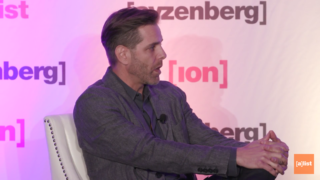Matt Wolf, vice president of entertainment, ventures and strategic alliances at the Coca-Cola Company is a gamer, but just a few years ago, that wasn’t so mainstream—or even widely understood. Wolf took on the monumental task of integrating a constantly moving, niche eSports audience into a century-old brand strategy and somehow made it all work out with tremendous results.
Wolf joined the fourteenth iteration of the [a]list summit Thursday at the Intercontinental Hotel in Los Angeles and dished details to a room filled with marketers across a gamut of industries and shared how the soft drink brand turned the tide in gaming with activations in FIFA and League of Legends.
“[ESports] is a niche, but it’s really, really big,” said Wolf. “As a consumer packaged goods brand, we understand that learning in this space when we did (activating for about three-to-four years) that it’s a green pasture. You can really reach the hearts and minds of the fans. If you go through the right channels with the game makers and the players, it really becomes a good run.
“What I was trying to do was prove to the Coca-Cola Company that gaming had the power to be a difference-maker for us in our marketing and communications. ESports, I felt, was a great first foot into that because it was still fairly new in North America and Europe at the time, and there weren’t a lot of big brands taking a crack at it. It was a bet.”

Just four years ago, when Wolf would quiz colleagues about eSports, no hands would go up. “This was four years ago,” he shared. “Getting into it early, we had to figure out our own blueprint. We had to figure out how to get into this space, how to do our brand justice, ensure that the volume of communication around our marketing was at a certain point . . . but at the same time, was meaningful and provided a value to the community. That was key.”
“We take a multi-pronged approach [to eSports]. We have our frontline marketing communication, which is the way we brand our product into the space. Then we have the relationships that we make with the influencers, which is key. You can’t really lean into this space and get that value back as a brand unless you’re really able to hit it from a content standpoint, an influencer standpoint, and from a social media standpoint.”
Coca-Cola wanted its message to be organic and not forced, something that Wolf attributes to patience and careful consideration.
“We came in humble, we took our time, learned and we didn’t hold ourselves to any one through-line that we had to stick with.”

